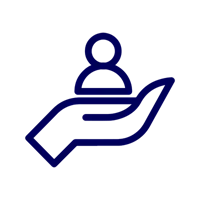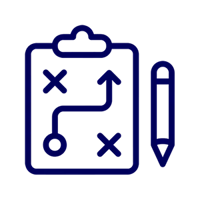
Ailsa Swanney
TAR Support Engineer at CNOOC International
Those who think they can and those who think they can’t are both usually correct. In order to achieve your goals, you must believe you CAN and have confidence in your own ability.
About Ailsa...
Who am I?
"I feel that the personality types: coach, coordinator and manager are all close matches to me. All 3 personality types require good communication which I feel is one of my strengths. When I was younger, I knew I wanted a job that involved speaking to people and working as part of a team however, I thought that engineers sat by themselves completing calculations all day and this was not something I was interested in. When I realised, that in fact, you are in constant communication with other people, the career prospect became far more appealing. Being an engineer requires technical capability but also the ability to get on well with other people. As a graduate engineer, I am required to move between teams, so it is important to be friendly and adaptable which are two of the qualities of a coach. In my current role, it is essential to be organised and pull together information from lots of different sources. I also provide support to others in my team out with the main remit of my role which is a quality of a coordinator. My career aspiration is to become a manager as I feel that I will be able to lead a team successfully due to my team player attitude, organisational skills and ability to motivate others. "
What do I do?
"As I am currently part of a graduate programme, I am fortunate to have the opportunity to gain experience across a range of roles within the company. I started my career within the Process Facilities Engineering team where my main responsibilities included completing calculations, writing technical notes and supporting operational issues raised by the offshore assets. This gave me an opportunity to apply some of the theory I had learnt at university in real life scenarios. I worked in a multi-discipline engineering team, liaising with mechanical, instrument and safety engineers on a daily basis. I enjoyed solving the challenges faced and learning from the expertise of others in my team. I am now working in a team that are preparing for a shutdown of an offshore platform later this year. It is necessary to shutdown to complete essential safety checks and maintenance that cannot be completed whilst oil and gas is being produced. My main role in the team is to ensure that the platform can be restarted safely when all the work scopes are completed. It is critical that the restart process is completed safely and in a timely manner to mitigate any safety incidents or delays to production restart. In order to execute the restart efficiently, I am preparing lots of documentation to highlight all the work scope locations offshore, to ensure they are checked prior to restart. Once the shutdown is complete, I will move into my next role which will be based offshore. I will be working as an Offshore Operations Engineer, working a 3 weeks offshore, then 3 weeks off rotation. I thoroughly enjoy the diverse roles and responsibilities that my job has to offer. The graduate program is giving me an opportunity to develop a broad range of skills which will aid me to becoming a Chartered Chemical Engineer in a few years’ time. It is also giving me the opportunity to find out what area of work I enjoy the most. The starting salary for my job was £38,000. "
How did I get here?
"Having grown up in Aberdeen, I was exposed to the oil and gas industry from a young age however it wasn’t until my final year at school that I really understood how I could play a role in such an exciting and challenging industry. With my subject choices at school (maths, chemistry & physics) and interest in problem solving, studying Chemical Engineering seemed the clear path. After my 2nd year at university, I completed a summer placement with an oil and gas company in the Technical Safety Department. In order to secure this placement, I speculatively sent my CV to approx. 80 companies in Aberdeen looking to gain work experience and was fortunate that 1 company offered me an interview and subsequently a job! I returned to the same company the following summer to complete a second placement and had to opportunity to go offshore for one week. I completed my offshore survival training before boarding a helicopter and heading out to a platform in the North Sea. Being only 20 years old and also a female, this was a daunting yet exciting experience to enter a male dominated environment (there were 2 other females offshore out of a crew of ~200 people). It was a fantastic opportunity during my studies to see the classroom theory in operation. The following summer, I completed another summer placement with a different oil and gas company in a process engineering team. During my final semester at university, as part of my Masters project, I completed a placement in yet another oil and gas company. This time I was based in the Flow Assurance team which was a new area of work for me. I believe that gaining such a vast range of work experiences prior to graduating from university provided me a solid understanding of the oil and gas interest and cemented my decision to pursue a career in this industry. Not only did it prepare me with knowledge for working in the industry but also the skills required to work in an office environment – speaking to people, asking questions, attending meetings etc. "
The life I live
"In my spare time I love to be outdoors! Whether it be running, cycling or hill walking, I enjoy exploring new places and finding new routes on my doorstep and further afield. Most days after work or during my lunch break, I try to get out on my bike or go for a run to release some energy and keep myself physically and mentally fit. I have climbed 77 out of 282 Munros in Scotland (a Munro is a hill over 914.4m) and aim to complete them all one day! Climbing Munros requires a good level of fitness and also a lot of planning to ensure that routes across some of the most remote areas in Scotland can be safely executed. I like the sense of freedom and remoteness when completing walks and not seeing another person all day and the feeling of achievement after a long day on the hills. In addition to being outdoors, I also play netball in my spare time. Netball played a pivotal role in my university experience, both playing and coaching the university team. Being part of a team is great fun and I have made lifelong friends through netball. Since graduating, I have joined a local team and enjoy socialising with my team on and off the court. "
My typical day
"On a typical day I log into my computer at 8am and check my emails first of all. I normally write a ‘to do’ list before I finish work the day before, so I know what my priorities are for the following day. At 9am every day, we have a team call to go through the key focuses for the team and receive any new information that may be relevant to our planning. I then spend the day preparing documentation using word and excel, marking up drawings as well as writing operational procedures that will be carried out in preparation for the shutdown.In addition, I attend a range of meetings throughout the week such as planning meetings, safety risk assessments, and vendor meetings. I communicate via email or speak on the phone daily to a range of people: my team, people working on the offshore assets, technical experts, external vendors and onshore support engineers. As a team, our main goal is to execute a safe shutdown of the platform. Every hour of every person’s time offshore is accounted for during the shutdown to ensure that the maximum number of work scopes can be completed. By completing work scopes whilst the platform is shutdown, this ensures that the platform can operate safely and more efficiently on a day to day basis. "
My qualifications
"o\tHighers: Maths, English, French, Chemistry, Physics (2013)o\tAdvanced Highers: Maths, Chemistry, Physics (2014)o\tMasters in Chemical Engineering, University of Strathclyde, Glasgow (2014 – 2019)After graduating from university, I joined the CNOOC International graduate programme as a Process Engineer in October 2019. I am currently 1.5 years through a 5 year program designed to provide me with a range of opportunities across the business. I will have the opportunity to develop my engineering capability as well as enhance my interpersonal skills: team working, communication, problem solving decision making etc. I am excited by what my future career will look like working at CNOOC International! "



